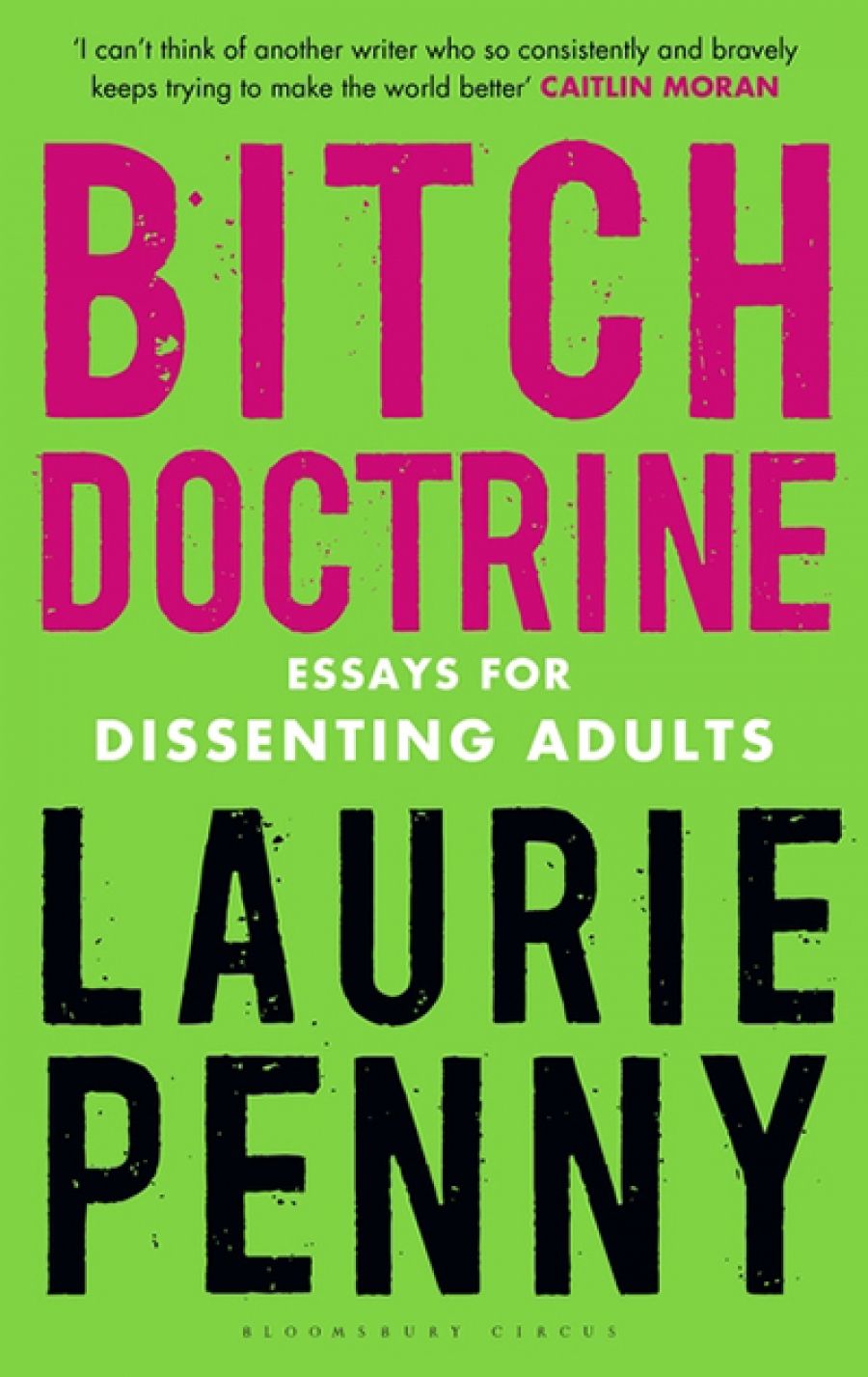
- Free Article: No
- Contents Category: Essay Collection
- Custom Article Title: Suzy Freeman-Greene reviews 'Bitch Doctrine: Essays for dissenting adults' by Laurie Penny
- Review Article: Yes
- Online Only: No
- Custom Highlight Text:
Like Wonder Woman loping across a battlefield, arms raised, bracelets repelling bullets, Laurie Penny charges boldly into the culture wars. In Bitch Doctrine, we traverse trigger warnings, misogynistic trolls, sex work, commodity feminism, gender identity, transphobia, free speech, nerd entitlement, left-wing rape apologists ...
- Book 1 Title: Bitch Doctrine
- Book 1 Subtitle: Essays for dissenting adults
- Book 1 Biblio: Bloomsbury, $24.99 pb, 373 pp, 9781408881613
Bitch Doctrine is a collection of columns and essays written by Penny between 2013 and 2016. After a feisty introduction (‘I’m not interested in making my politics safe and sweet and unthreatening for men’), they are grouped thematically in eight chapters. Penny is a contributing editor at the New Statesman and writes for publications including Vice and The Guardian, but we are not told where or when most of these pieces were published. This is frustrating, as some seem dated already.
Penny’s voice is knowing, astringent, ironic, and fiercely smart. She is especially good at highlighting hypocrisies and picking holes in arguments. If men got pregnant, she writes, ‘pro-life activists’ would be called ‘forced-birth extremists’. In one fine essay, she demolishes the monolithic ideal of romantic love and catalogues the benefits to young women of being single. Men, she writes, are allowed to think of romantic love as ‘a gift that they expect to be given’. Women, by contrast, ‘learn from an early age that love is work’.
At her best, Penny opens your mind, offering glimpses of a different way of living. In one essay, she tells of her commitment to polyamory, also known as ethical, non-monogamy. Over the past ten years she has been a ‘single poly’ with no main partner, dated people in open marriages, and been in three-person relationships. Rather than ‘marriage, mortgage and monogamy’, this version of ‘having it all’ involves ‘talking honestly about feelings’, ‘setting realistic expectations’ (and yes, ‘shagging around’).
Penny describes herself as ‘a radical’ and alludes to socialism on occasion. But while she talks breezily of the need for structural change, there is little detail on how to achieve it. Eventually, she fesses up. It is hard to talk about the leftist vision for a better world, she tells us, ‘for the simple, human reason that we’re worried we’ll be laughed at’. This seems a cop-out. Fear of mockery doesn’t bother her when wading into gender issues. I’d like to know more, for instance, about the commune where she lives. Surely given the obscene inequity of today’s housing market, transforming living arrangements will be vital to achieving social change.
I am glad that Penny is out there, making rapid-fire interventions with bracelets raised. Despite receiving death threats and being told she deserves to be raped by ISIS, she writes back to the armies of men who attack her with ‘relentless spleen’. While offering an insight into today’s backlash against feminism, she weaves in accounts of feminists from earlier eras, connecting their bravery to contemporary struggles: women like Emily Davison, the English suffragette who leapt in front of George V’s racehorse at the Epsom Derby in 1913; and the American Nellie Bly, one of the first ‘gonzo journalists’, who got herself admitted to a nineteenth-century insane asylum to write about it.
 Laurie Penny (Bloomsbury)Still, as I read this book, I found my attention often waning. The columns started to sound repetitive, regardless of their ostensible topic and the rightness of her arguments. (Toxic masculinity is destroying the world ... Women’s unpaid labour should be valued ... Feminism requires men giving up special privileges.) Collections of columns are easy fodder for publishers. I would like to see Penny write an original book where she goes out into the world, reporting on this dark, historical moment and delving more deeply into those resisting the populist right.
Laurie Penny (Bloomsbury)Still, as I read this book, I found my attention often waning. The columns started to sound repetitive, regardless of their ostensible topic and the rightness of her arguments. (Toxic masculinity is destroying the world ... Women’s unpaid labour should be valued ... Feminism requires men giving up special privileges.) Collections of columns are easy fodder for publishers. I would like to see Penny write an original book where she goes out into the world, reporting on this dark, historical moment and delving more deeply into those resisting the populist right.
One of the weakest parts of Bitch Doctrine is the section on Trump’s ascension. Things are moving at such a crazy, dread pace that polemics written days or weeks after his election no longer matter. Like a ‘fatberg’, in Naomi Klein’s memorable words, Trump dominates the body politic, each Tweet-laden day bringing a fresh crisis. Amid Penny’s sweeping statements about misogynists, ‘frightened women’, and ‘the white patriarchy’, there is a glaring omission in her response to Trump’s victory. According to CNN exit polls, fifty-three per cent of white American women voted for him. As unpalatable as this statistic is, feminists must acknowledge and try to understand it.
Just as Penny ignores Trump’s appeal to women, there is scant acknowledgment here of men (even straight, white ones fond of chargrilled meats) who are committed to feminist ideals. Yet late in Bitch Doctrine, in an essay on Mad Max: Fury Road (2015), Penny notes that come the collapse of civilisation, men and women will need to cooperate to survive. When the world burns, she writes, ‘we must learn to survive each other, because we can’t survive without each other’.


Comments powered by CComment